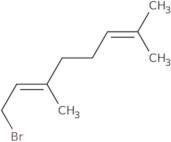Geranyl bromide
CAS: 6138-90-5
Ref. 3D-FG29320
| 2g | Descatalogado | ||
| 5g | Descatalogado | ||
| 10g | Descatalogado | ||
| 25g | Descatalogado | ||
| 50g | Descatalogado |
Información del producto
- (E)-1-Bromo-3,7-dimethylocta-2,6-dienetrans-1-Bromo-3,7-dimethyl-2,6-octadiene
- (2E)-1-Bromo-3,7-dimethyl-2,6-octadiene
- (2E)-1-bromo-3,7-dimethylocta-2,6-diene
- (2E)-Geranyl bromide
- (E)-1-Bromo-3,7-dimethyl-2,6-octadiene
- (E)-1-Bromo-3,7-dimethylocta-2,6-diene
- 2,6-Octadiene, 1-bromo-3,7-dimethyl-, (2E)-
- 2,6-Octadiene, 1-bromo-3,7-dimethyl-, (E)-
- 3,7-Dimethyl-2,6-octadienyl bromide
- trans-Geranyl bromide
- Ver más sinónimos
Geranyl bromide is a hydroxylated analog of geraniol. It has shown in vitro antifungal activity against various fungal species, including Candida albicans and Aspergillus niger. Geranyl bromide can be synthesized using the palladium-catalyzed coupling of halides with 2-methyl-1,4-benzenediol. The synthesis methods are not limited to this method, however. The molecule also inhibits the enzyme hepg2 cell and prevents HIV infection by blocking the synthesis of viral DNA. This drug also has antioxidant properties and may be used as an oxidation catalyst to prevent brain infarction or other oxidative damage to tissues. Geranyl bromide can also inhibit p450 activity in mammals, which may lead to side effects such as tiglic acid production.





